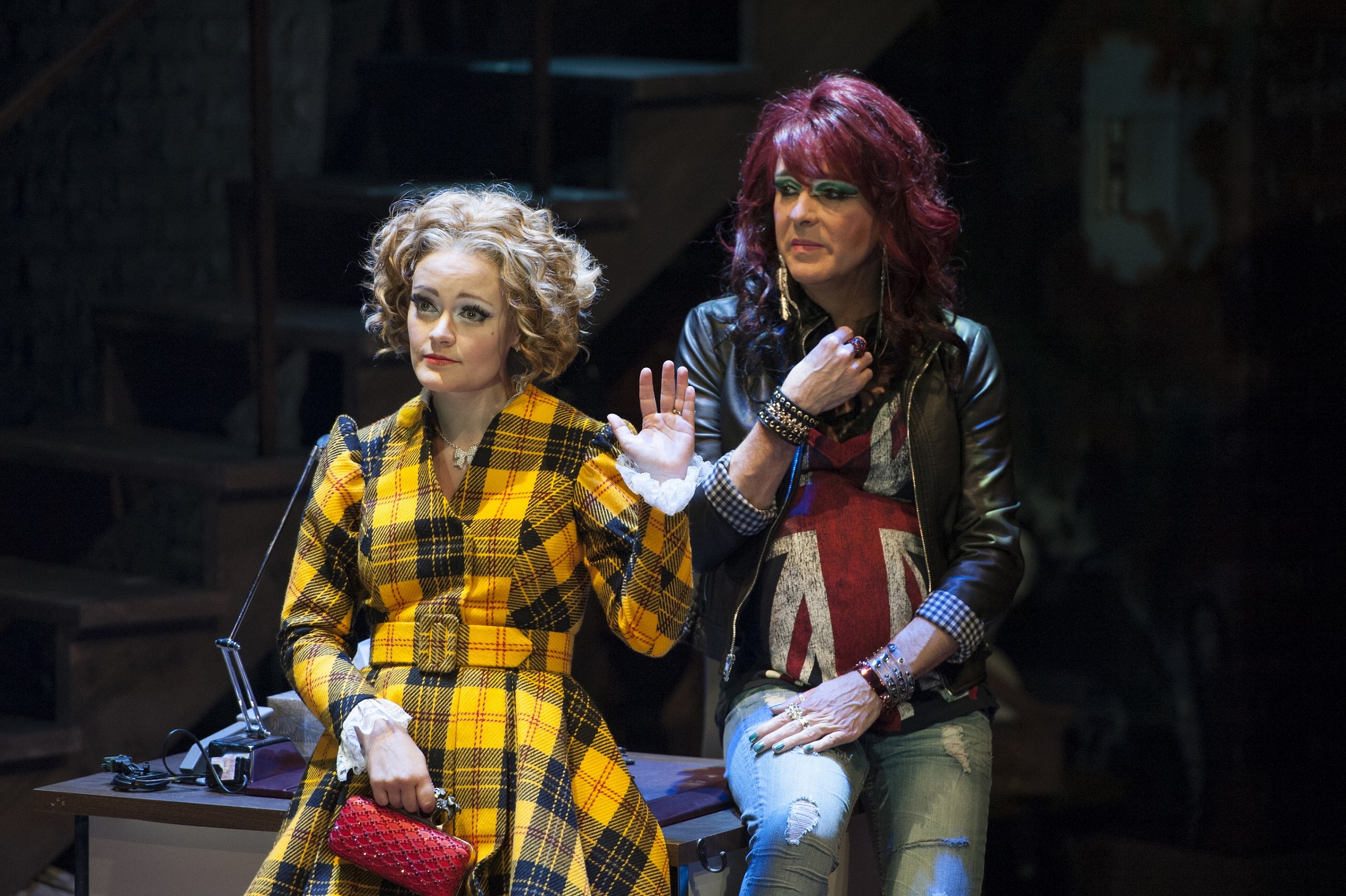
Polly Peachum (Erin Driscoll) and Lucy Brown (Rick Hammerly) vie for the love of Macheath in “The Threepenny Opera,” now playing at Signature Theatre through June 1, 2014. Photo by Margot Schulman.
Meh. That’s the best way to describe Signature Theatre’s production of The Threepenny Opera. But I can’t blame them for it. After all, it was written to be that way. Sort of.
Playwright Bertolt Brecht, who lived in Germany through the mid 20th century, believed that theatre was meant to be a forum for political ideas, in the hopes that it would result in actual social and bureaucratic change. Most notably authoring plays such as The Caucasian Chalk Circle and Mother Courage and Her Children, he is also credited with establishing the genre of Epic Theatre, of which almost all his plays, including The Threepenny Opera, are a part of.
Epic Theatre is based on the idea that a play should not create any type of emotional cartharsis or cause the spectator to identify emotionally at all with the characters or action on stage. By denying the audience any type of impassioned feeling, he believed it would instead allow them to adopt a critical socio-political view designed to provoke self-reflection and be moved to effect real change in the world.
To achieve this effect, Brecht’s Epic Theatre relies most importantly on verfremdungseffekt, which essentially is the effect of deliberately distancing or estranging the audience from what they are viewing. The Threepenny Opera, therefore, is purposely written to keep the audience at bay in the hopes of creating enough social rumination that its spectators will leave the theatre as active advocates for civic change.
The problem with Brecht’s Epic Theatre is that unless the perfect combination of political, social, cultural, and theatrical production elements occur—as was the case with the original 1928 Berlin production, which played more than 400 times over two years, sparking an entire movement of non-Aristotelian drama—the principle of verfremdungseffekt will leave the audience unmoved and uninspired, as was the case with Signature Theatre’s production.
Based on John Gay’s 1728 play The Beggar’s Opera, The Threepenny Opera tells the story of the morally corrupt working-class Peachum family who conspire to have London’s most notorious criminal and playboy Macheath arrested after he marries their seemingly innocent daughter. As the show progresses, the audience discovers that every single character in the show is utterly corruptible and reprehensible, and begs the question of who actually deserves to be punished for their sins if everyone is disgraceful.
Director Matthew Gardiner and his design team have created a visually interesting show, making use of tableau to generate a series of lovely live images. Costume designer Frank Labovitz’s costumes fit the nature of the characters perfectly, and the intricacies of video designer Rocco Disanti’s projections were fun to watch (particularly the stock ticker that subtlely has all positive stocks drop to negative worth before they finish scrolling). Gardiner has a keen eye for detail, which was evident in both the design of the show as well as providing the only real layer of depth in a deliberate one-dimensional production, which served as the only truly interesting part of the show.
This was especially evident in Erin Driscoll’s (as the ingénue Polly Peachum) Barbara’s Song, where she explains to her parents (played with impressive zeal by Bobby Smith and Donna Migliaccio) why she married the criminal Macheath (Mitchell Jarvis). The musical highlight of the show, Driscoll managed to break Brecht’s intended verfremdungseffekt to actually draw in the audience emotionally, taking them on her humorous journey of lust. Rick Hammerly, who played Lucy Brown with such remarkable conviction that I had a hard time believing the female character was actually a male actor, was able to rise to the challenge of pulling me in emotionally so that she became the only character whose ending I actually cared about. Similarly, Smith also has a knack for naturally drawing the audience in and I found myself trying to connect with him, despite the script’s inherent attempts to detract me from doing just that.
Unfortunately, Brecht’s desire to remove all emotional connection to the show and its characters was quite successful, regardless of the fact that the cast was stellar. Jarvis’s commendable performance as Macheath (reminiscent of Johnny Depp’s Captain Jack Sparrow in the Pirates of the Caribbean trilogy) was not enough to keep me from caring whether or not he was actually hung in the end and, despite having an incredible singing voice, Natascia Diaz’s (as the prostitute Jenny)familiar Flick Knife Song (also known as the popular crooner tune Mack the Knife) left me feeling blasé at best.
Although my indifference to the show may have been a result of some flaw in this particular production, it was unclear where any specific flaw was, if at all. The show, as a whole, is actually very well put together. The cast is extremely talented, the production quality spot on, and the direction was well thought out. For this reason, I can only attribute my apathetic reaction to Brecht’s intentionally detached script and composer Kurt Weill’s music, which is notoriously devoid of favorable melody.
Signature Theatre’s production succeeded in accomplishing Brecht’s desire of having me be nothing more than an emotionally passive spectator. Where it (and Brecht) failed was that I did not leave the theatre feeling any type of self-reflection or the need to invoke any type of socio-political change. I don’t know if it’s because my world of 2014 Washington DC is a just too different from 1928 Berlin, or because the production was unable to find that fine line that is perhaps required to successfully initiate social change. All I know is I left the theatre with only one feeling. Meh.
The Threepenny Opera performs now through June 1, 2014 at Signature Theatre, located at 4200 Campbell Avenue, Arlington VA 22206. Tickets start at $40. For more information, call 703-820-9771.